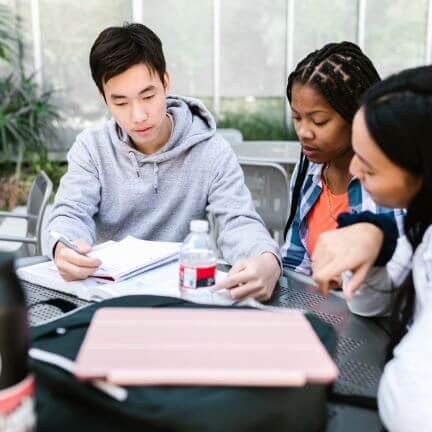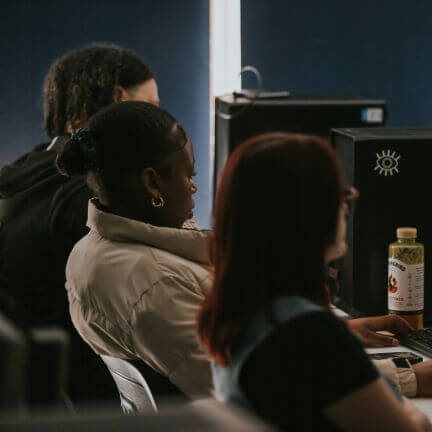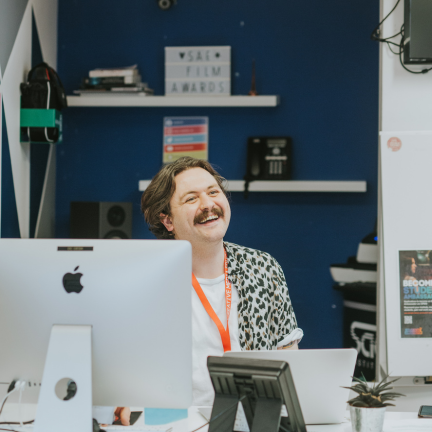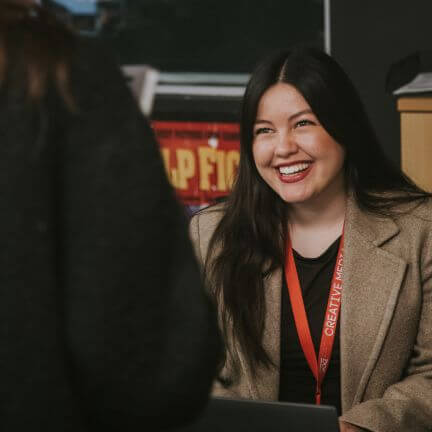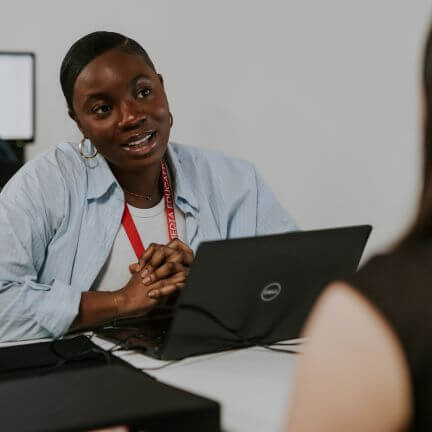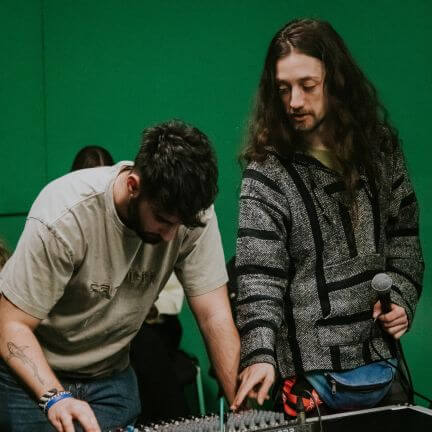Disability, Wellbeing and Learning Support
At SAE, we’re dedicated to helping you excel academically and fully embrace the opportunities that come with studying. Our services will support you every step of the way, ensuring you achieve your best and make the most of this transformative experience.

DISABILITY, WELLBEING AND LEARNING SUPPORT AT SAE
At SAE, we want you to excel in your academic life, and to take full advantage of the opportunities that open up to you while studying in London, Liverpool, Leeds, Glasgow or Leamington Spa.
We know that many students require some extra support with this, for various reasons, and we are very happy to provide a flexible and personalised support service for all our students – whether Additional Learning Support, support with wellbeing and mental health, or support with disability and access to facilities and learning resources.
Our team is in place to help you access the support you require to successfully engage in your studies.
We know that studying can be tough; likewise moving away from home for the first time. Life also has a habit of throwing obstacles in our way when we least expect them. We are here to help you overcome the problems you may encounter while studying with us, ensuring those with specific support needs can access academic and non-academic support to help them succeed.
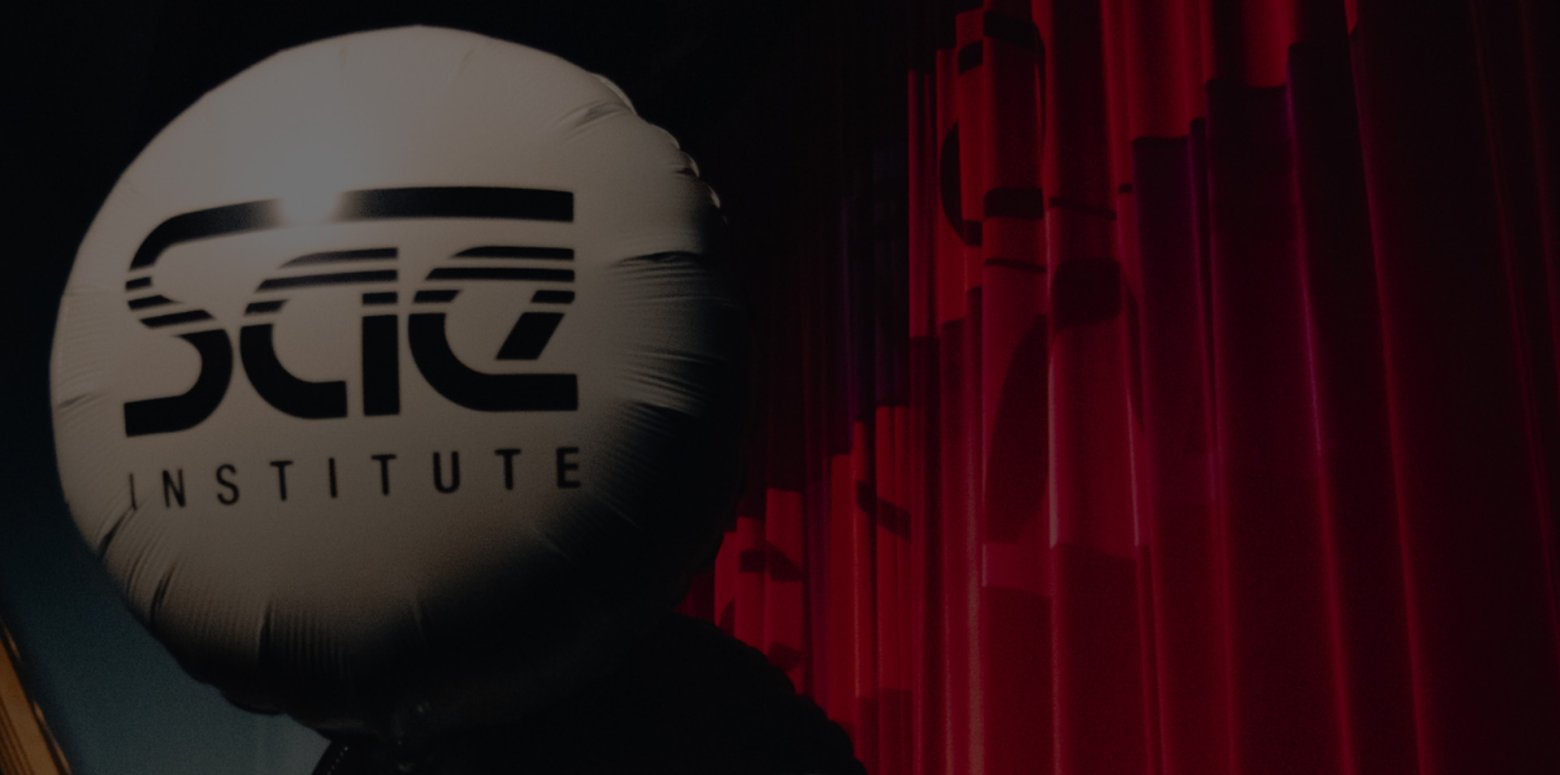
WHAT THE STUDENT SERVICES TEAM OFFERS
It’s important to remember that SAE offers a wide range of support. You should seek advice at the earliest opportunity, to ensure that we can fully meet your additional support needs.
The SAE Student Services Team provides a range of services to students, including:
- Free screening for dyslexia/Specific Learning Difficulties (SpLD).
- Support with accessing a full diagnostic assessment for SpLD (e.g. dyslexia).
- Support and advice when applying for Disabled Students Allowance (DSA).
- Arranging and facilitating additional support within SAE (disability, wellbeing and learning support).
- Directing you to specialist support services not provided by SAE.
- Information, advice and guidance on maintaining wellbeing as a student.
We treat student wellbeing as a priority and acknowledge the challenges presented by life as a creative student. Our team reinforces our whole-college commitment to good mental and physical health and happiness. We can help students locate the appropriate organisations and professionals for direct support, whether this is within SAE or with external services and organisations.
Alongside supporting students with specific needs, our team also hosts a variety of ‘wellbeing’ events throughout the year aimed at all SAE students, to help boost your health, confidence and general wellbeing. Please see the headings below for further information on the types of support offered at SAE.
WHAT SUPPORT WE OFFER
INFO FOR PARENTS & GUARDIANS
TOP TIPS FOR STUDENTS
Starting in September? Find out all you need to know - visit our Enrolment & Induction page.
STARTING IN SEPTEMBER
Starting a higher education course at any institution can be an amazing and life-changing experience, but it can also bring its own unique challenges.
To support new students starting with us in September or even if you are just feeling a bit unsure about starting back at SAE, our team have put together their recommended links to resources we have found to navigate you through those challenges and find the answers to some of those difficult questions.

Student Minds
Student Minds, the UK’s student mental health charity, have two new guides available to download here that you can reach for when you need helpful tips for understanding university life:
- Know Before You Go is a life skills guide for school and college students covering study skills, finances, housemate issues, identity, and mental health.
- Transitions is a resource for current students, offering advice on time management, relationships, finances, mental health, and more.
- Practical Tips this section is full of tips and resources to help you with the transition (back) to university!
Leapskills
Leaving home for the first time is very exciting, but it’s also a time of big change and many of you will be starting to think about moving out of home and into accommodation with people you’ve never met before.
Unite Students, one of the UK’s largest student accommodation providers, have developed the Leapskills program which is a free resource designed to “support young people with the transition to independent living by reducing the expectation gap that young people have before arriving at university”.
It is a mix of real-life scenarios, brought to life by a digital game, student insight shared video content and discussion points. You can do this at home as a 45min to 1-hour digital session which you can work through on your own or with a parent or member of your household.

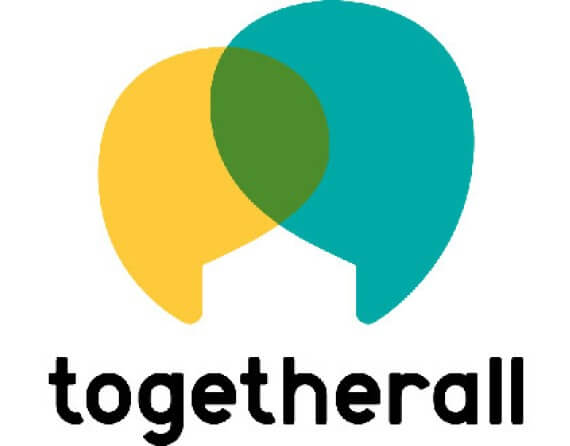
Togetherall
Togetherall is an online community and safe space to talk, share and support others like you. Access is free to all students at SAE by logging on with your @sae.edu email address. It is available 24/7, 365 days a year.
You can also have access to a range of online courses on topics such as Improve Your Sleep, Managing Anxiety, Managing Stress and Worry, Coping with Grief and Loss and Problem-Solving to name a few.
FAQs
When we talk about disability (or disabled students), we mean any student with a long-term condition that can affect the way they study. For example, if you have dyslexia or ADHD this could affect the way you take notes, read text or write essays; or if you have anxiety or depression, this could affect your motivation, focus and concentration or your organisation and time-management skills. ‘Disability’ also covers long-term medical conditions, if they have an impact on your studies or day-to-day life.
What the law says
The Equality Act 2010 says that people can be described as ‘disabled’ if they have a physical or mental condition (or impairment) that has a ‘substantial’ and ‘long term’ negative effect on their ability to do normal daily activity.
If you’re unsure whether or not we can support you, or if you meet this definition of ‘disability’, please get in touch or ask to book a confidential 1-1 appointment with one of our Disability Adviser. Even if you don’t have a diagnosed condition, please get in touch ASAP if you have ever had learning support before (e.g. exam arrangements) or think you may need it at SAE. Please contact your local Student Wellbeing team for more information:
SAE Glasgow – studentservicesglasgow@sae.edu
SAE Liverpool – studentservicesliverpool@sae.edu
SAE London – studentserviceslondon@sae.edu
SAE Leamington Spa – studentservicesleamingtonspa@sae.edu
Some people are reluctant to disclose a disability because they fear that it might affect their SAE application or result in them being treated differently by SAE staff. Please be assured that this is not the case at SAE and that it is illegal for any UK college or university to discriminate against any student or applicant for a disability-related reason, including for course admission decisions.
You can request that no information about your disability is passed on to anyone at SAE outside the Student Support Team, if this is important to you, and we will be happy to discuss this and will completely respect your final decision. However, if you do this it may restrict/adversely affect the level of support SAE can offer you and could limit the types of adjustments which can be put in place on your course.
If you consent to information about your disability being shared with other staff (e.g. your teachers), this consent will normally be valid until you finish your course. However, you may withdraw your consent at any time by contacting our local teams:
SAE Glasgow – studentservicesglasgow@sae.edu
SAE Liverpool – studentservicesliverpool@sae.edu
SAE London – studentserviceslondon@sae.edu
SAE Leamington Spa – studentservicesleamingtonspa@sae.edu
Although we strongly encourage students to disclose a disability so that they can access the additional support they are entitled to, we fully respect any student’s right not to do so and will act in accordance with your wishes.
There are many benefits to disclosing your disability, and it is usually a very positive thing to do this as far in advance as possible before your course starts. As part of reasonable adjustments, some students with disabilities may be eligible for special exam arrangements, such as extra time or rest breaks. Some might be eligible for academic and/or library support, such as permission to record lectures, provision of reading lists, advanced copies of lecture notes and slides or extended library loans. In order to receive special exam arrangements students will need to register with the Student Support Team and provide medical evidence of how their disability or health condition affects their studies. The student’s entitlement to reasonable adjustments will be based on the medical evidence provided.
Please note: Students must note that consideration and preparation of special exam arrangements requires time and, therefore, are advised to register with the Student Support Team as early as possible and well in advance of the start of their exams.
We won’t share any disability or support-related information that you disclose to us unless you give us clear written permission to do so. If you do want us to make any additional disability or learning support arrangements, we might have to tell some other people who are involved in your support but we will only do this with your explicit consent. If you register with the Student Support Team this won’t be added to your degree certificate and we won’t ever tell your future employers or other colleges. We will not share information with your parents, carers or family members without your explicit consent, which we record through a separate process.
Please note: In circumstances where there is a significant concern for a student’s (or someone else’s) safety or welfare, we may share confidential information without your consent; this allows us to respond without delay and to work together to reduce risk to anyone in danger or at risk of serious harm.
Your information is kept confidential in line with the current UK General Data Protection Regulations (GDPR). For a more detailed explanation of how your personal data is stored and used, you should visit the SAE website and read General Privacy Notice or contact us:
SAE Glasgow – studentservicesglasgow@sae.edu
SAE Liverpool – studentservicesliverpool@sae.edu
SAE London – studentserviceslondon@sae.edu
SAE Leamington Spa – studentservicesleamingtonspa@sae.edu
If you need disability support at SAE such as exam support, support from your lecturers etc. you’ll need to register with our team.
In order to understand your disability and provide you with guidance and support, we will ask you to complete our referral form and provide evidence of your disability. This could be a GP letter, Psychologist assessment or diagnostic report. You can upload your evidence via this form, or send to us by email or post. You can email your evidence to your local team:
SAE Glasgow – studentservicesglasgow@sae.edu
SAE Liverpool – studentservicesliverpool@sae.edu
SAE London – studentserviceslondon@sae.edu
SAE Leamington Spa – studentservicesleamingtonspa@sae.edu
Or alternatively, post it to “The Disability and Wellbeing Team” at the relevant address of your campus of study.
The form allows you to provide full or restricted consent to share your information with SAE staff. By completing this form and providing evidence of your disability, you can start the process of accessing additional support for your studies at SAE.
Has anyone ever told you they think you might be dyslexic? Did you ever get extra exam arrangements at your previous school or college, e.g. extra time, a separate room, access to a reader or scribe, or use of a laptop or computer to type your exam answers? If so, please get in touch as these things could be a sign of dyslexia, or some other disability or Specific Learning Difficulty.
Dyslexia affects around 10% of the population and is often hereditary. It affects the way people process, store and retrieve information, and can lead to difficulties with memory, organisation, time-management, sequencing, reading and writing.
If you think you might be dyslexic or aren’t sure if you have previously been diagnosed or not, please get in touch to find out more information. We can arrange free online dyslexia screening for SAE students and we can also offer full dyslexia assessments at a reduced cost.
Personal care needs to be arranged through your home social services. Please apply early as this can take a long time to arrange. For more information, please visit the government website.
Disabled Students Allowance is additional government funding for disabled students in UK Higher Education. It is available for any UK disabled student who is already studying or about to study a higher education course. It is not means-tested, is not added to your student loan, and you do not have to pay it back after your course.
DSA covers additional study-related costs that you may incur because of your disability or learning support requirements. It doesn’t provide you with money, but instead, it pays directly for the support you need, for example specialist computer hardware or software; specialist 1-1 support sessions throughout your course; taxi transport if you cannot travel on public transport; additional costs of printing or photocopying.
If you have a learning support requirement or disability and you are thinking of studying at SAE, then you may be entitled to Disabled Students Allowances (DSA). Applying for DSA is essential for any student who requires additional support with their learning in UK higher education. If you want to benefit from the support available through DSA you should apply as soon as possible, and you can apply from the same time that student finance applications open (usually around Spring-time).
It can take up to 14 weeks for DSA applications to be processed, so please apply as early as possible to prevent any delays with getting your DSA support in place for the start of your course.
We can help you with your application for Disabled Students Allowances, so please don’t hesitate to ask if you need help or have any questions. Please get in touch or book an appointment with one of our advisors by emailing your local team:
SAE Glasgow – studentservicesglasgow@sae.edu
SAE Liverpool – studentservicesliverpool@sae.edu
SAE London – studentserviceslondon@sae.edu
SAE Leamington Spa – studentservicesleamingtonspa@sae.edu
International students from outside the European Union (EU) are not eligible for Disabled Students Allowance. Students from EU countries are usually eligible for DSA if they have been permanently resident in the UK for at least five years before the start of their higher education course. They will need to provide formal written evidence of their diagnosis or disability. UK students who can provide formal written evidence of their diagnosis or disability should be eligible for Disabled Student Allowance, even if they have previously had student loans.
We’re only able to provide formal disability support to people who could be seen to have a long-term disability as defined by the Equality Act. If you have a short-term illness or injury that lasts or is likely to last less than one year, then you should still contact us to see what support may be possible, although this may be limited and only provided on a short-term basis.

Got questions?
For any general enquiries, our Admissions Team is your first point of contact—feel free to reach out using the button below, and we’ll be happy to assist.If your query is related to additional support, disability services, or confidential wellbeing support, you can get in touch with our Student Services Team by registering with them through the referral form below.













